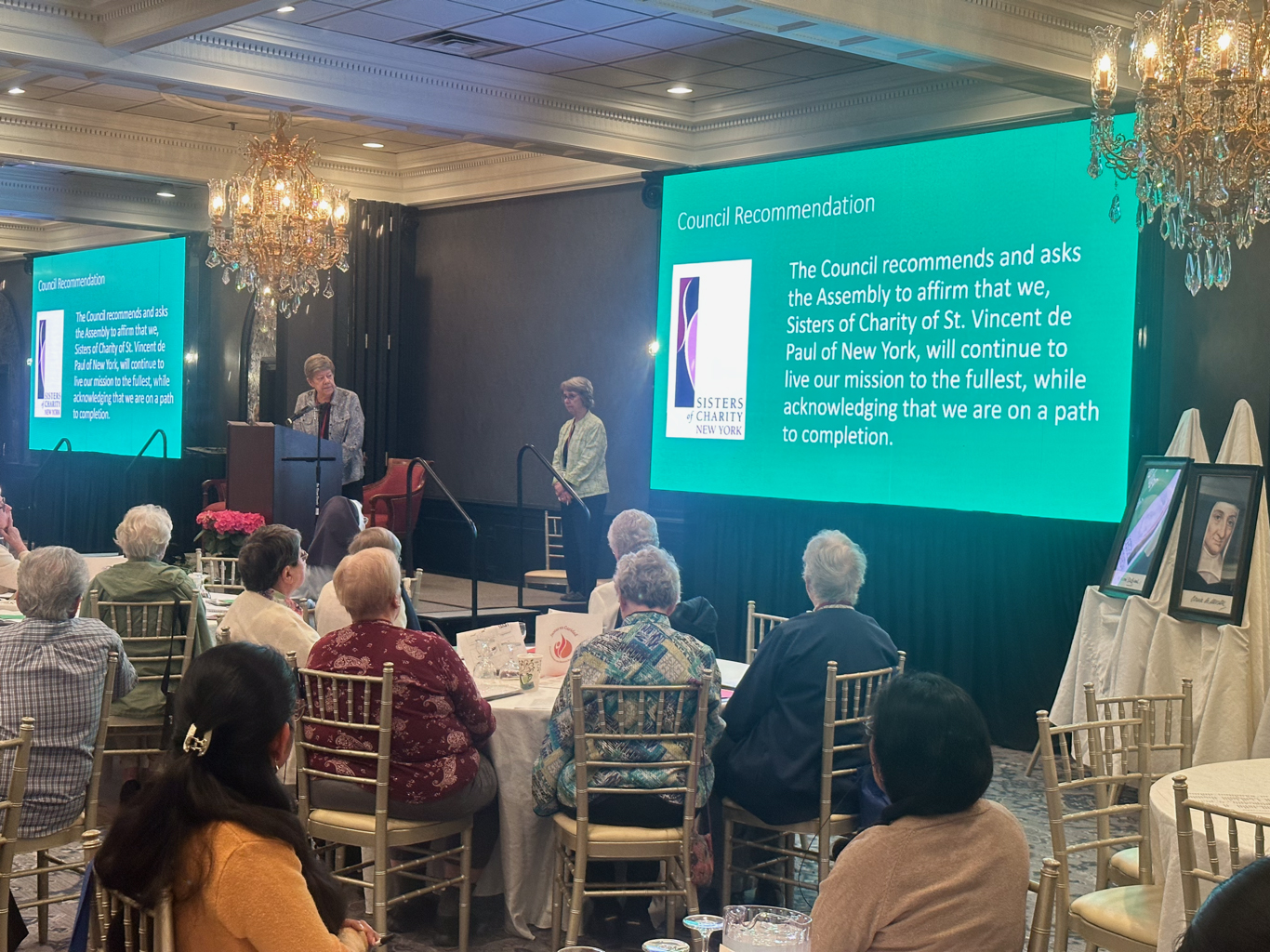
Sr. Donna Dodge, president of the Sisters of Charity of New York, reads the executive council's recommendation on the congregation's path to completion at their 2023 general assembly. (Courtesy of the Sisters of Charity of New York)
Editor's note: Global Sisters Report's Monday Starter is a feature from GSR staff writers that rounds up news from or about women religious that you may otherwise have missed.

The Sisters of Charity of New York, one of the oldest congregations in the United States, has approved a recommendation that puts the congregation "on a path to completion" and will no longer accept new members.
In an April 27 statement, the congregation said delegates to the congregation's 2023 general assembly voted unanimously on April 13 to accept several recommendations, including one that the sisters will "no longer work toward finding nor accepting new members to our Congregation, in the United States." The congregation in Guatemala will continue to accept new members, the congregation said.
The delegates stated they continue to "believe in the future of religious life" and will "continue to promote vocations, and redirect inquiries" to other Sisters of Charity congregations.
The statement also said the assembly members affirmed that the sisters will "continue to live our mission to the fullest, while acknowledging that we are on a path to completion."
"The decision was not an easy one," the statement said, noting that there are currently 154 Sisters of Charity of New York. "We will continue to grow in love. We will continue to deepen our relationships with each other, with our Associates and with our ministry partners. We will continue to deepen our relationship with our God."
The statement notes that this is not the end of the congregation's ministries: "Our mission will continue beyond our Sisters, through our Associates and partners in ministry, expanding what it means to live the charism of charity into the future."
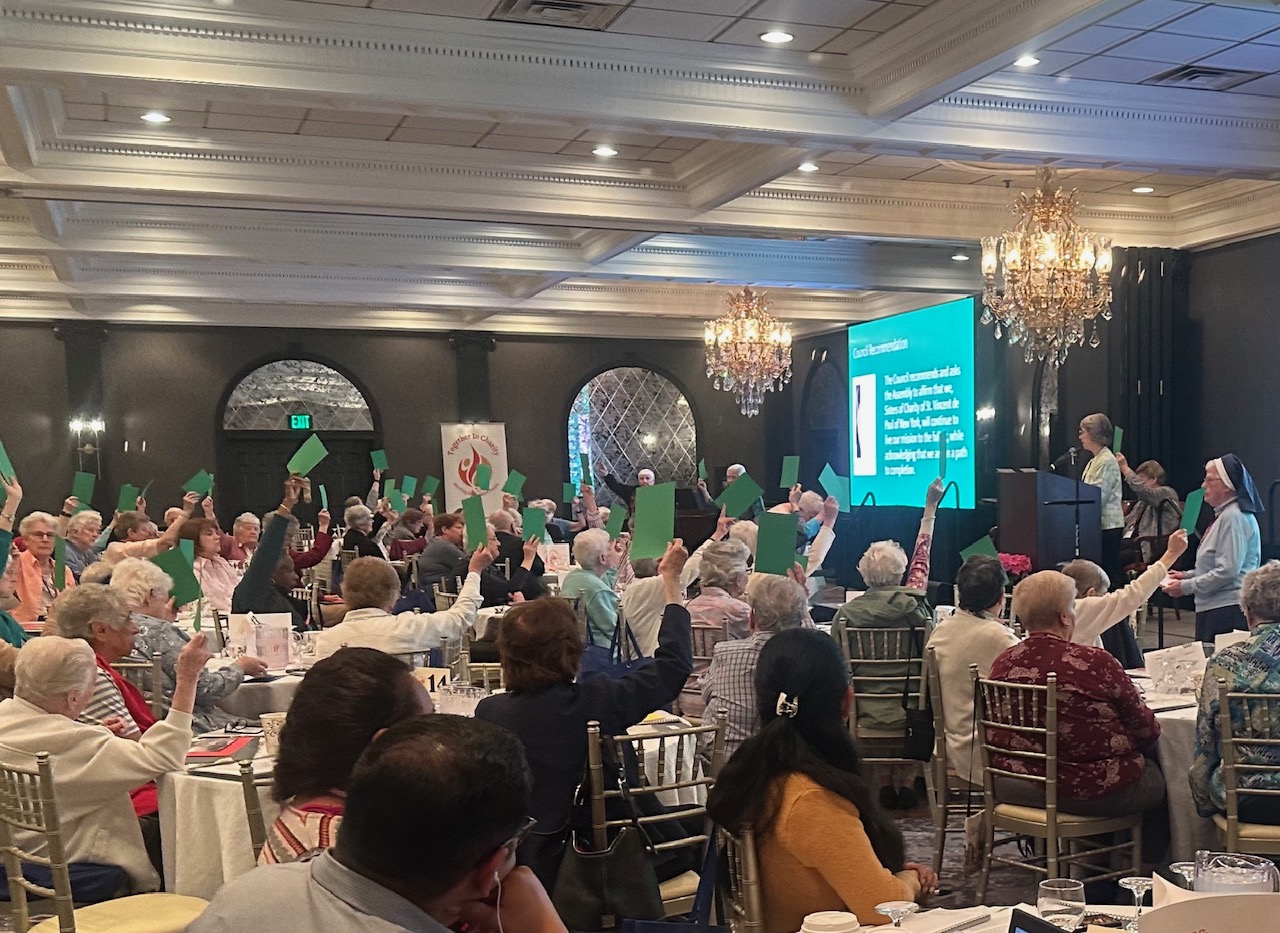
The Sisters of Charity of New York unanimously vote on the congregation's path to completion April 13 at their 2023 general assembly. (Courtesy of the Sisters of Charity of New York)
According to a congregational history, the New York-based congregation has its roots with the Sisters of Charity of St. Joseph's, which was founded by St. Elizabeth Ann Seton, a native New Yorker, in Maryland in 1809.
In 1817, Seton sent three sisters to New York City to help care for orphaned children, a growing problem in the city at that time. In 1846, the history said, the sisters established a new independent community in New York.
The congregation has opened or staffed 185 schools, 28 hospitals, 23 child care institutions, and other ministries "to care for people on the margins of society."
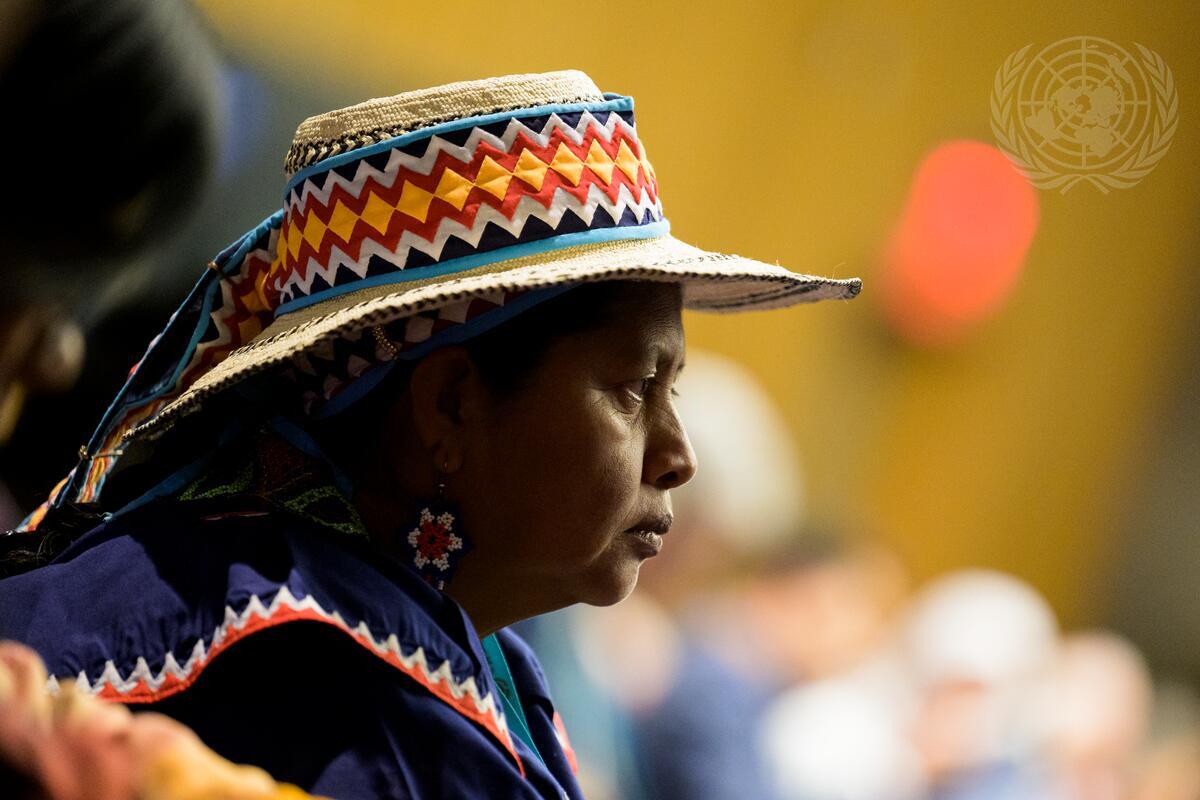
A participant at the 22nd United Nations Permanent Forum on Indigenous Issues, held April 17-28 at U.N. headquarters in New York (UN Photo/Manuel Elías)
With Dominican support, Ecuador Indigenous present at UN meeting
Indigenous people from throughout the world gathered April 17-28 for meetings at the United Nations Permanent Forum on Indigenous Issues, bringing messages of affirmation, witness and need to the global body.
Economic exploitation of a nation's resources that favors outsiders will mark "the extinction of our ancestral knowledge and culture in general," Waakiach Kuja Jawarit, president of the Achuar nation in the Ecuadorian Amazon area, said April 24 at U.N. headquarters in New York.
"The future is in the waters, in the forests and in the land," he said.
A six-member Achuar delegation was hosted by the Dominican Leadership Conference, which U.N. representative Adrian Dominican Sr. Durstyne "Dusty" Farnan said was "an honor and really a privilege."
The Dominicans have an established relationship with the Achuar in Ecuador, providing financial support through a ministry trust grant, so it was fitting that the Dominicans helped obtain visas and assist with other travel arrangements for the delegation members. The visit marked the first time the Dominicans hosted a nonecclesial Indigenous group at the forum.
Once at the United Nations, the delegation members spoke at the event and met with other Indigenous organizations and U.N. representatives.
In his April 24 appearance, Jawarit, who was representing 13,000 inhabitants in a 3,100-square-mile area, said his people face threats from logging, mining and oil industries.
The Achuar seek full autonomy from the Ecuadorian government so they can better protect their territory, which Jawarit described as vulnerable and under threat.
In his testimony, Jawarit asked that the Ecuador Ministry of Culture and Heritage help promote culturally sensitive tourism as a source of income for the Achuar as well as supporting "sustainable bio-economy projects"; the promotion and patenting of ancestral medicines; and better promotion of bilingual education so the Achuar "do not forget our language and our knowledge."
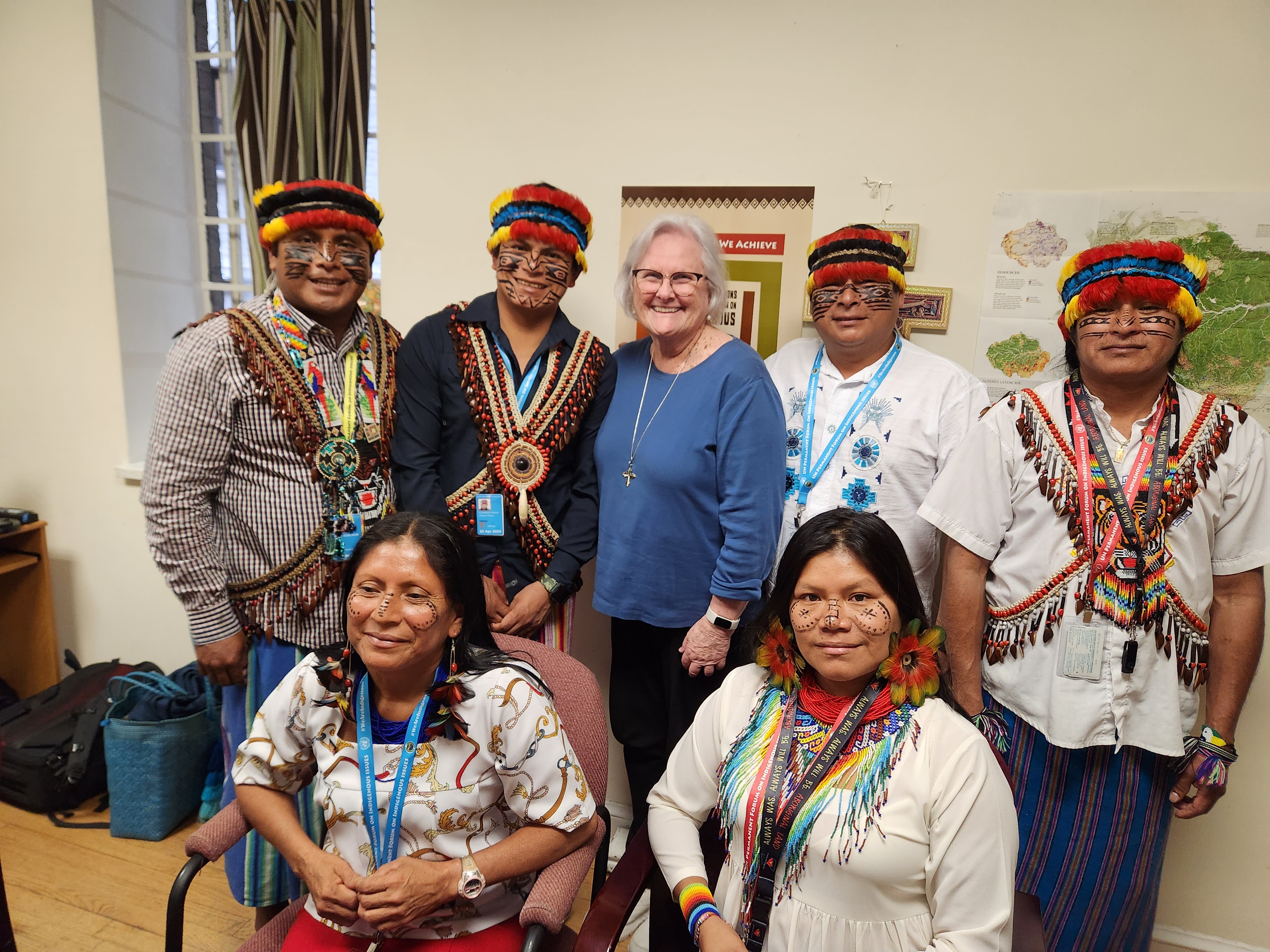
Adrian Dominican Sr. Dusty Farnan, center, with members of a delegation from the Achuar nation in the Ecuadorian Amazon area during the United Nations Permanent Forum on Indigenous Issues, held April 17-28 at U.N. headquarters in New York (GSR photo/Chris Herlinger)
The nation also needs more trained teachers and school supplies for a quality education, he said.
Noting the threat of climate change to the Amazon Basin, Jawarit said his nation does not want additional construction of roads without their prior approval and consent.
"We are known as warriors," he said of the Achuar nation's commitment to protecting the environment, adding that "inheritance and power" are needed to "protect our Mother Earth." He said global support is necessary to protect the Amazonian lands.
In an interview with Global Sisters Report following the delegation's appearance at the United Nations, Achuar delegation members said they were gratified by their welcome and encouraged that they are not alone in their struggles.
"We never realized our community is involved in a global fight," said delegation member Jose Domingo Peas Gualinga, noting the connections between groups in neighboring Colombia and Peru and other non-Latin American nations. "The struggle is the same."
Women in the delegation praised the encouragement of Catholic sisters and the United Nations conference for emphasizing the need to empower women and girls in Indigenous communities.
"We work together, and we fight for all. The jungle is the home for all," said Rosa Mercedes Illanes Vargas.
"They trust us," Valeria Wiwir Etzamaren Vargas said of the Catholic sisters, adding that the affirmation of the sisters and others is essential in the overall struggle to protect the Amazon.
"The jungle is our pharmacy, supermarket and hardware store," Vargas said.
The theme for this year's forum, which was completely in person following pandemic challenges the last three years, was "Indigenous Peoples, human health, planetary and territorial health and climate change: a rights-based approach."
People fleeing clashes between the paramilitary Rapid Support Forces and the army gather at the bus station in Khartoum, Sudan, on April 19. (OSV News/Reuters/El-Tayeb Siddig)
NGO head: Humanitarian situation in Sudan is worsening
A Massachusetts-based humanitarian group that works with sisters in Sudan reports that the humanitarian situation in that country is steadily declining as ongoing factional fighting continues.
"The horrendous fighting in Sudan continues," Kristen Fanfant, the executive director for Medicines for Humanity, told Global Sisters Report in an April 24 email. As a result, she said, "desperate Sudanese families have been running out of food and other supplies as they shelter in their homes from the gun battles, bombardment and airstrikes on the streets outside."
She added: "Hospitals have been damaged and forced to close or have been overwhelmed by the wounded, with staff exhausted and medical supplies depleted. Increasingly, armed fighters have turned to looting shops and robbing anyone who dares step outside."
The overall situation, she said, is grim: "The military and its paramilitary rival have agreed to strike a truce three times, however all attempts to end the violence have collapsed. In the past week, the continual fighting has left hundreds of people dead and thousands injured. Loud gunfire could be heard from the capital city of Khartoum, and witnesses reported airstrikes, tank fire, and mass troop movements."
Advertisement
Fanfant noted that Medicines for Humanity works with the Diocese of El Obeid and several other partners in Sudan. These partners include Good Shepherd Sisters in El Obeid; the Mother Bakhita Sisters in El Obeid and Khartoum; the Sacred Heart Sisters in Khartoum; and the Missionary of Charity Sisters and community clinics in the Nuba Mountains in southern Sudan.
"We have been in contact with the bishop of El Obeid and the sisters to assess everyone's safety and determine their needs," Fanfant said. "The bishop and sisters have told us that there is an immediate need for food, water, medications, basic medical supplies, hygiene supplies, cooking gas, and water filters."
As the conflict continues, Fanfant added, "there will be need for security enhancements for the sisters' convents and clinics, shelter for families fleeing violence, refrigerators for storing food, medications and vaccines, solar panels to provide power when electricity is limited, and more. We are working to see how we can support the partners. Luckily, the fighting has not yet affected the Nuba Mountains, so all are safe there."
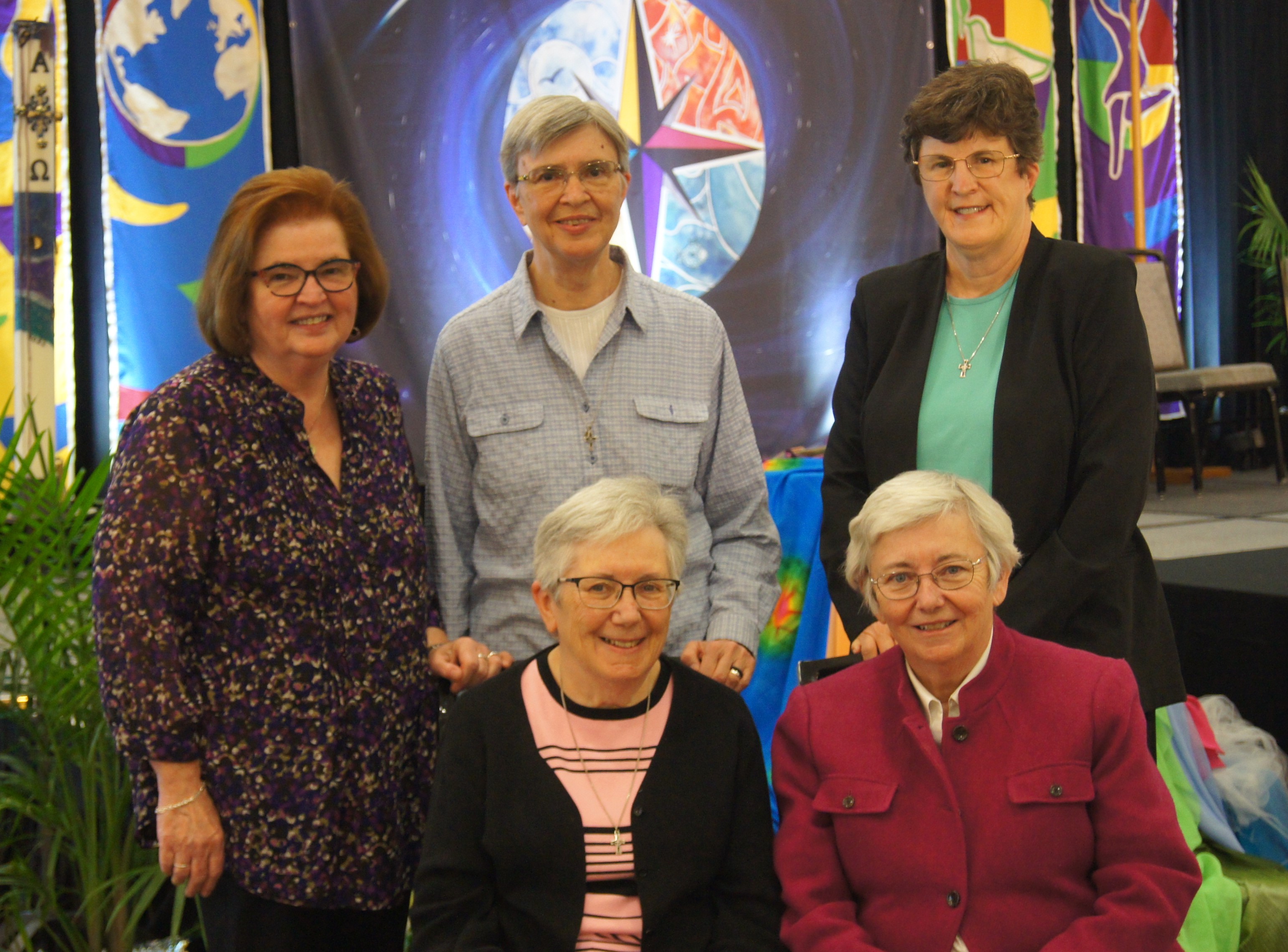
The Sisters of Mercy of the Americas' new leadership team, clockwise from left: Sr. Maureen King, Sr. Judith Frikker, Sr. Teresa Bednarz, Sr. Susan Sanders, Sr. Patricia Flynn (Courtesy of the Sisters of Mercy of the Americas)
Sisters of Mercy of the Americas chooses new leadership team
The largest single congregation of women religious in the United States has chosen a new leadership team.
The Sisters of Mercy of the Americas closed out their seventh chapter April 22 by electing Sr. Susan Sanders as president. Sr. Patricia Flynn, Sr. Teresa Bednarz, Sr. Judith Frikker and Sr. Maureen King were elected to the leadership team.
Terms are for six years and begin Aug. 1; the chapter was held in St. Louis. The Sisters of Mercy of the Americas was formed in 1991 by the merger of several separate Mercy congregations. By 2019, the separate entities were canonically merged, and only the single congregation exists, with the exception of the Religious Sisters of Mercy of Alma, Michigan, which remains separate.
Sanders entered the Sisters of Mercy in 1973 and holds a doctorate in public policy from the University of Chicago. She founded the McAuley Institute, a program focused on providing housing to low-income seniors, and the Center for Religion and Public Discourse at St. Xavier University in Chicago, where she also served as the vice president for university mission and heritage. She has been in community leadership since 2013.
Sanders assumes the office from current president Sr. Patricia McDermott, who has served in leadership since 1991, including two consecutive terms as president.









